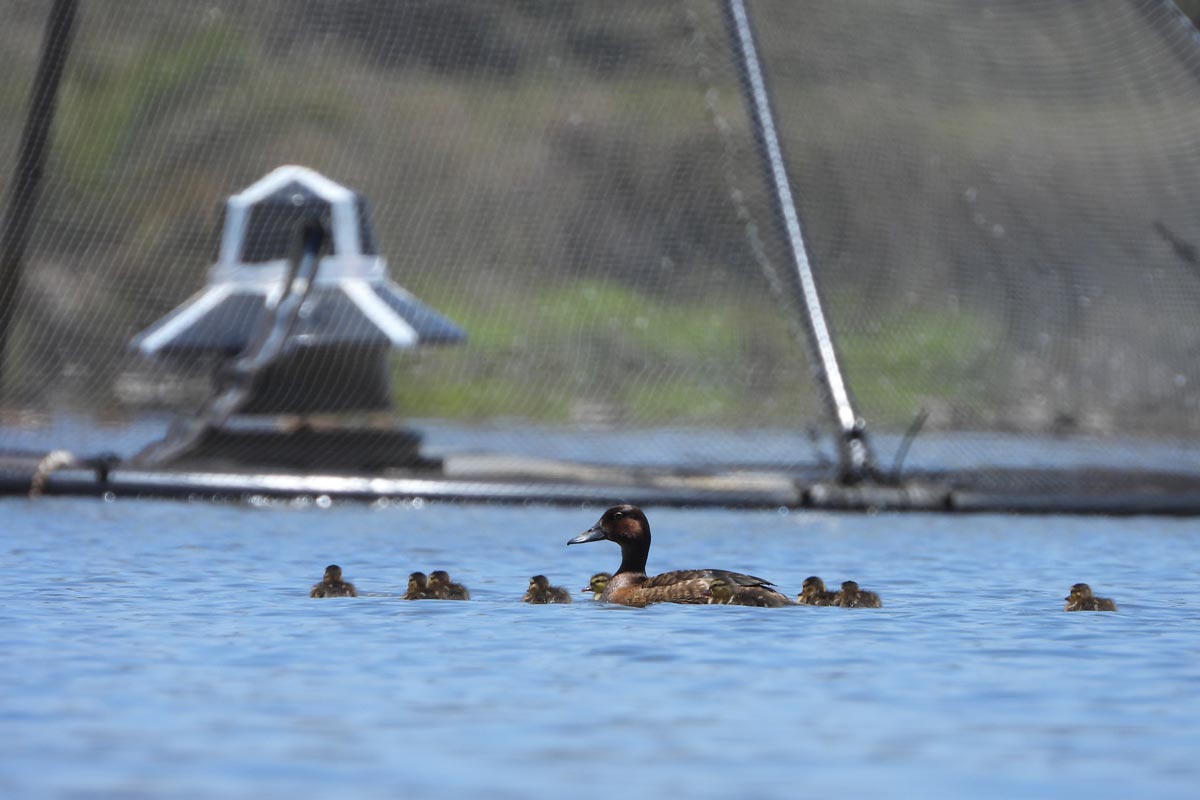New milestone reached for world's rarest duck
An initiative to bolster the wild population of the world's rarest duck has recently completed its latest step.
Between September and November 2021, 35 captive-bred Madagascar Pochard were released at Lake Sofia, a remote site in the north of Madagasacar, where a reintroduction scheme has been ongoing since 2018. There is only a three-month window each year, during the dry season, when it is possible to transport the birds 200 km to Lake Sofia. This latest release now brings the total number of reintroduced adults on the lake to 47.
The releases were carried out by Durrell Wildlife Conservation Trust's team in Madagascar. Due to COVID-19 restrictions, international experts from Durrell and the Wildfowl & Wetlands Trust (WWT) were unable to travel to Madagascar to work with their colleagues in-country, but online daily discussions and decisions meant that global expertise was available throughout.

Madagascar Pochard using the floating aviaries at Lake Sofa (Durrell Wildlife Conservation Trust).
Durrell's Head of Birds, Dr Glyn Young, said: "The current releases are a fantastic achievement and a testament to the entire team on the ground in Madagascar: those looking after the captive population and breeding and rearing birds for release to those ensuring that the ducks have settled in safely to their new home on Lake Sofia.
"Reflecting back to when the project first started in 1989 and there seemed no hope for the species, I am so proud to be where we are today. The pochard is not yet safe but it has a fighting chance thanks to this wonderful team."
Madagascar Pochard was believed to be extinct for 15 years until its rediscovery in 2006. Some 20 ducklings were secured from the wild in 2009, from which a captive population of more than 100 birds has been established in a conservation-breeding facility in the regional capital of Antsohihy. Wild numbers of the bird currently stand at around 70 at just a single site in Bemanevika, northern Madagascar.
Durrell's Wetlands Manager, Felix Razafindrajao, said: "For these releases, we have built on the success from 2018. This included increasing the time the birds spent in the floating aviaries, so they adjust to the site and their first experience of the wild.
"Implementing these changes allowed us to ensure the welfare of the birds as we could observe them for longer in the floating aviaries as well as upon release onto the lake."
Nigel Jarrett, WWT's Conservation Breeding Manager, led the pioneering methods for the release. "After extensive research, we chose Lake Sofia as the best site nationally for reintroduction," he said. "But we knew the lake is in poor condition, and does not yet have sufficient natural food to support these birds.
"So we designed the world's first floating aviaries, platforms and feeding stations, to ensure the birds can access food and to encourage them to remain on the site. Away from Lake Sofia, wetlands are heavily degraded and the pochard's prospects would be very low."

A previously released female Madagascar Pochard with ducklings at Lake Sofia, with a floating aviary in the background (Durrell Wildlife Conservation Trust).
This latest release is the project's second on Lake Sofia. It is just one step in a much larger plan to revive and rewild Madagascar's wetlands. The project partners have been working closely with communities around the lake for more than five years to improve farming and fishing practices, making them more productive, environmentally sensitive and sustainable – and which will help restore a habitat that can support pochards. The project has the full support of the local communities.
Peter Cranswick, WWT's Project Manager, said: "A duck has been the catalyst to save a lake, to restore a habitat that allows wildlife to flourish and to provide many benefits to the communities that depend on its resources. We are even planting a forest as part of the project.
"This is the epitome of successful conservation – a positive collaboration between many partners and stakeholders, empowering those who live in and off this landscape to shape a sustainable future. There is still much to be done, but that the ducks released in 2018 have already bred on Lake Sofia bodes well for that future."
"We are very pleased with how our latest release has gone," added Felix Razafindrajao, "but pochard numbers on the lake are still very low and therefore at risk, so more releases are required to increase Lake Sofia's population and ensure its long-term viability. Further releases are planned for 2022, and we look forward to updating everyone on the next exciting stage in the programme."
The Madagascar Pochard Project is a partnership between Durrell, WWT, The Peregrine Fund, Asity Madagascar, and the Government of Madagascar.

